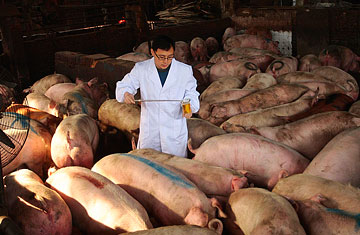
A health quarantine officer collects urine samples of pigs from Henan province to run tests at a pig farm in Nanjing
There are fresh concerns about the safety of China's food supply after the country's largest meat processor was last week reported by CCTV, China's state TV broadcaster, to have produced and sold pork tainted with a banned drug. The drug, clenbuterol, also known as "lean meat powder" is a fat-burning animal feed additive that causes nausea and dizziness if consumed by humans. A total of 158 pigs from nine farms in central China's Henan Province have been contaminated, according to state media reports.
The company, Shuanghui Group, reacted swiftly, issuing an apology and their 'Shineway' brand meat products off supermarket shelves were promptly pulled form the shelves. The government responded by sending ministry-level officials to oversee local investigations. By Monday Mar. 21, some 2,000 tons of pork and pork products were recalled and more than two dozen people connected to the case have been fired or suspended from their jobs.
This is the latest episode in a long series of food safety scandals and has renewed fears sparked by the so-called 'tainted milk scandal'. In late 2008, an estimated 300,000 babies were sickened and six killed from consuming milk powder tainted with melamine. Since then, mistrust of Chinese-made milk powder has led to a significant decrease in domestic production and a fast growing appetite for imported dairy products. According to a China Dairy Industry Association report issued earlier this year, domestic output of baby formula milk powder dropped by 12 percent in 2010 from a year ago, and almost half of the country's milk powder market has been now dominated by foreign brands.
Public outrage over the melamine scandal led, in 2009, to new food safety regulations and harsher penalties for those who break the law. But, as this latest incident shows, the new protocols have not eliminated the problem. Indeed, earlier this month, several tons of condensed pig blood, an indispensable ingredient in some Chinese dishes, was contaminated with formaldehyde — a highly toxic chemical used as a preservative. The company, Shuanghui Group, reacted swiftly, issuing an apology and their 'Shineway' brand meat products off supermarket shelves were promptly pulled form the shelves. The government responded by sending ministry-level officials to oversee local investigations. By Monday Mar. 21, some 2,000 tons of pork and pork products were recalled and more than two dozen people connected to the case have been fired or suspended from their jobs.
The persistence of food safety problems underscores the challenges faced by China's regulators. Though the 2009 laws were a positive step forward, they are proving hard to enforce. China's agricultural sector is vast and difficult to monitor "There are always loopholes in a random sample inspection," admitted Wang Zongli, an agriculture official investigating the Henan pork scandal told state media. Chen Junshi, a professor specializing in nutrition and food safety at the Chinese Center for Disease Control and Prevention, warned that the clenbuterol-tainted pork from Henan might well be the tip of the iceberg. "Given the sheer number of pig farmers located all over the country, each one of them operating on a relatively small scale, I think the use of clenbuterol is virtually inevitable," Chen said, adding that he wouldn't be surprised if an individual pig farmer, lured by short-term profits, would still take the risk. "The same also holds true for many other food safety crises as well."
Chen said change was possible, but it would take a while. "Coming up with a system that effectively regulates individual farmers is a long process, and so is the process to educate them and teach them a sense of right and wrong," says Chen. "It all takes time. Don't expect things to change overnight."
